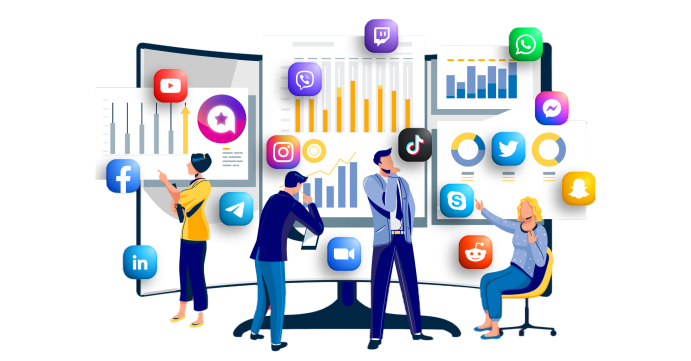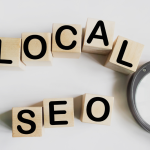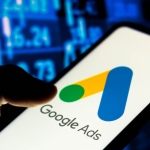By 2025, a robust digital marketing strategy will be indispensable for every business aiming to stay ahead in a rapidly evolving industry. People spend more Time on mobile devices and online platforms, seeking genuine connections with the brands they trust. Traditional marketing channels like radio industries or television advertising can no longer singlehandedly sustain a company’s growth. Instead, embracing online marketing, social platforms, and innovative digital communication will help businesses capture new audiences, nurture customer loyalty, and achieve commercial objectives. In this blog post, we explore why a digital marketing strategy is critical and how it can drive success in 2025.
The Importance of a Digital Presence
A strong digital presence ensures that potential customers easily discover a brand across digital marketing channels. With so many devices and social media platforms available, people expect to engage with brands in real Time. Whether someone is searching on Google or browsing ads on search engines, businesses without a cohesive digital strategy risk losing out to competitors.
Establishing a digital presence also allows companies to reach a wide range of prospective customers. A single social media channel can connect a brand to thousands—even millions—of people who share similar interests. This approach to digital advertising transcends geographic barriers, enabling marketers to tailor a promotional message to a precise target audience. In comparison to Traditional marketing channels, digital platforms are far more flexible, allowing for incremental level improvements, audience tuning, and real-time adjustments to ad spend.
Key Components of a Digital Marketing Strategy
Developing a digital marketing strategy requires a strategic approach that aligns with your core objective and commercial objectives. The following components form the bedrock of effective digital marketing campaigns, allowing digital marketers to reach current customers and prospective customers across various digital channels. google
Search Engine Optimization (SEO)
Search engine optimization is the practice of enhancing website content and structure to rank higher on search engine results. By using specific terms that resonate with a brand’s potential customers, SEO helps generate organic traffic without relying solely on paid advertising. Invalid traffic and fraudulent traffic can undermine marketing budget efficiency, so SEO best practices also focus on reliability in terms of user intent, which significantly improves the quality of impressions against people who are genuinely interested in a brand’s offerings.
Content Marketing
Content marketing is the art of creating valuable, relevant material that informs, entertains, or guides a target audience. Whether it’s blog posts on advertising blogs, videos, or infographics, content has the power to engage people at every stage of the customer journey. The Content Marketing Institute and American Marketing Association emphasize that well-crafted, consistent content fosters trust and positions a business as an authoritative resource. From Beginner level guides to in-depth pieces on marketing mix or Marketing analytics, content marketing covers all aspects of a brand’s identity, driving traffic and nurturing customer loyalty.
Social Media Marketing
Social Media Marketing revolves around leveraging social media platforms—such as Facebook, Instagram, LinkedIn, and emerging social platforms—to connect with current customers and prospective customers alike. A skilled social media marketer recognizes the positive aspects of each social media channel, employing influencer marketing or native advertising to amplify brand reach. This flexible message platform and power through cross platforms foster deeper engagement by delivering targeted content to the right audience at the right Time.
Email Marketing
Despite the rise of digital display marketing and social media, email marketing remains a cornerstone of digital marketing efforts. The success of email marketing lies in its ability to send personalized, timely updates to segmented audiences. It’s a direct line of communication that enhances customer loyalty, delivers a wide range of advertisements, and drives conversions. According to “2019 B2B Content Marketing Research,” email campaigns consistently rank as one of the top digital marketing channels for return on investment.
Benefits of Digital Marketing

Digital marketing offers positive aspects that Traditional marketing channels struggle to match. With the right marketing strategy, digital channels can open a range of courses and a broad scope of new possibilities to grow your brand.
Measurable Results and Analytics
One of the most significant advantages of digital marketing is the ability to measure performance. Tools within desktop devices and mobile devices such as Google Analytics provide insights into audience measurement, invalid traffic detection, and the average Time visitors spend on your site. Marketers can track promotional message performance across online display advertising deals, adjusting spend or creative based on real-time data. Marketing analytics also offer deeper audience tuning, ensuring your marketing budget is optimized for maximum return. This stands in stark contrast to older approaches like television advertising or radio industries, where impressions against people are more difficult to measure accurately.
Real-Time Adaptability
Digital marketing channels let marketers change tactics, content, and spend in real Time. If a Search Engine marketing campaign is underperforming, adjustments can be made instantly using platforms like Google Ads or social media platforms. This immediate reactivity eliminates the delays associated with Traditional marketing channels and ensures an incremental level improvement whenever necessary. With a typical approach, Commonly marketers set daily or weekly checks to refine performance and respond to current industry practices.
Enhanced Customer Engagement
Digital platforms allow marketing companies to foster direct interaction with an audience. Whether through social media marketing, influencer marketing, or mobile marketing, businesses can cultivate two-way dialogue with prospective customers and current customers. Such interaction extends beyond surface-level promotion, building deeper connections that strengthen brand loyalty. Engaging in conversations, encouraging reviews from people, and responding promptly to questions can boost brand reputation and trust.
Challenges in Digital Marketing

While the benefits of digital marketing are clear, there are also challenges that can impede growth. Digital marketers must adopt a strategic approach to overcome hurdles posed by the modern marketplace.
Competition and Market Saturation
With more businesses shifting to online platforms, the competition for consumer attention has intensified. Marketers need to stand out in a crowded digital advertising space where every social media marketer aims to optimize a social media channel to reach a target audience. Native advertising, search engine marketing, and affiliate marketing all compete for the same pool of prospective customers, posing a challenge marketers must face head-on by refining their message, content marketing, and overall marketing mix.
Keeping Up with Trends
Digital strategy evolves swiftly. Terms like “technological advertising,” “marketing in comparison,” and “digital communication” take on new meanings as the industry transforms at breakneck speed. The shift to mobile devices, the rise of video marketing, and the proliferation of influencer marketing are just a few examples of ever-evolving digital marketing efforts. Marketers who commit to continual upskilling—perhaps through a range of courses at the Digital Marketing Institute or by following Marketing News from sources like the Financial Times—are more likely to stay ahead of the curve.
Overcoming Technical Challenges
From ad-blocking software to invalid traffic, technical barriers abound in digital marketing. Fraudulent traffic drains budgets, and online display advertising deals can become costly if not set up with robust audience measurement tools. Ensuring reliability in terms of site performance and user experience is essential to retaining potential customers. Handling aspects like the exploitation in terms of user data, data privacy, and compliance requires both a beginner level understanding of digital communication laws and an incremental level commitment to ethical advertising practices.
Building Brand Awareness in 2025
In 2025, brand awareness hinges on how effectively marketers unify digital marketing plans. This includes harnessing a wide range of digital channels, from influencer marketing campaigns to digital display marketing. A brand’s identity must be consistently conveyed across all avenues—whether it’s the official website, social media platforms, or online platforms for advertising blogs.
The Role of Data Analytics
Data analytics plays a vital role in bridging the gap between a brand’s objectives and the actual outcomes of its digital marketing strategy. By analyzing user behavior, bounce rates, average base salaries for digital marketers, and other metrics, organizations can refine their marketing mix to better serve their audience. Cutting-edge platforms like Google Analytics yield insights into digital marketer performance, clarifying which digital marketing channels drive the highest conversions and which require more resources. In addition, Marketing analytics can highlight where a salary increase or redirection of marketing budget might lead to more effective campaigns and a stronger bottom line.
Strategies for Effective Branding
Effective branding in 2025 transcends the typical approach of showcasing logos or slogans. It involves a holistic strategy covering everything from influencer marketing to search engine optimization. Companies may opt for a flexible message platform that adapts content marketing based on real-time feedback. Additionally, brands must remain agile enough to shift resources and tactics across multiple social platforms. By fostering authenticity—be it through user-generated content or reviews from people—businesses can cultivate a reputation that resonates with potential customers.
The Customer Journey in Digital Marketing
The customer journey encapsulates every interaction between a brand and its audience, from initial discovery to post-purchase loyalty. Digital channels play a crucial role in each stage, guiding people to explore products, compare options, and finally make a purchase.
Understanding Customer Needs
To craft an effective digital marketing strategy, marketers must first understand the motivations of customers. Whether they are searching for quick solutions on search engine queries or browsing social platforms for inspiration, each step in their path is influenced by countless factors. Market research—such as analyzing Marketing News and exploring data from the American Marketing Association—enables digital marketers to gauge the wide range of potential customer interests. They can then tailor marketing strategy elements like social media marketing or influencer marketing to better match those needs.
Tailoring Marketing Efforts
Every piece of marketing communication should address the specific concerns and preferences of your target audience. By leveraging marketing analytics, brands can determine which social media channel is most effective for connecting with specific demographics, or which content marketing pieces yield the highest click-through rates. A thoroughly planned digital marketing strategy might allocate a portion of the marketing budget to Google Ads, a portion to email marketing, and another portion to affiliate marketing. This integrated approach allows marketers to optimize each channel and resonate with people on a personal level. Additionally, it solidifies the brand’s image in the minds of current customers and prospective customers alike, leading to more reliable brand recognition and loyalty.
Strengthening Digital Marketing Skills and Industry Insights

In the dynamic field of digital marketing, developing specialized digital marketing skills is vital for staying competitive and driving meaningful results. According to “2019 B2B Content Marketing Research” (-5671(15)01676-7.ISSN2212-5671.), the median salary for roles demanding advanced digital marketing skills continues to climb, reflecting the high value businesses place on top talent. Many professionals turn to resources like Digital Marketing Ins and the Journal of Marketing Channels.24(1–2.) to understand the display aspects of modern campaigns and the evolving complexities of digital platforms. By staying informed and investing in ongoing learning, marketers ensure they remain at the forefront of current industry practices, thereby maximizing their ability to plan and execute effective digital marketing campaigns.
The Rising Dominance of Mobile Devices and Affiliate Marketing
In today’s fast-paced environment, mobile devices have taken center stage, prompting marketing companies to place greater emphasis on mobile marketing and Affiliate marketing. As Google refines its ads on search engines, businesses are compelled to craft more dynamic promotional message strategies that align with both Traditional marketing channels—like television advertising or radio industries—and cutting-edge digital advertising tactics. Balancing these Marketing Channels requires a well-thought-out marketing mix that speaks to diverse objectives, from driving brand awareness to achieving vital commercial objectives.
Aligning Promotional Messages with Traditional and Digital Channels
A typical approach involves assessing the average time users spend on various platforms, using audience measurement tools and audience tuning techniques to pinpoint optimal moments for engagement. Despite the positive aspects of technological advancements, invalid traffic and fraudulent traffic remain persistent threats that can undermine campaign reliability in terms of return on investment. Marketers must also grapple with exploitation in terms of personal data and maintain ethical standards in line with current industry practices championed by organizations like the Digital Marketing Institute and American Marketing Association. As marketing evolves, publications such as the Financial Times, Marketing News, and advertising blogs continue to highlight the challenge marketers face in adapting to ever-shifting trends and regulations.
Addressing Technical Threats and Ethical Standards in Marketing
Meanwhile, the success of email marketing, fueled by marketing in comparison research from the Content Marketing Institute and Digital Marketing Ins, demonstrates the sustained impact of direct, personalized outreach. Integrating online display advertising deals within a flexible message platform can enhance a brand’s reach, reinforcing the power through cross platforms concept. This holistic vision incorporates not just display aspects of digital display marketing, but also an incremental level of integration between tools within desktop devices and mobile experiences, ensuring marketers cater effectively to Beginner level audiences and experts alike.
Impact on Salaries, Reputation, and Commercial Objectives
Ultimately, these evolving strategies influence everything from average base salaries to the likelihood of a salary increase in the field, as Commonly marketers who excel in marketing communications demonstrate value to organizations seeking growth. By taking advantage of a range of courses and embracing new technology, professionals can maintain a core objective of delivering value-driven, ethical marketing. As reviews from people add another dimension to brand reputation, savvy marketers strive for transparency and cohesion across a range of advertisements. In doing so, they carve out a path that respects commercial objectives, drives engagement, and underscores the positive aspects of a thoroughly modern, mobile-first marketplace.
Conclusion: Embracing Digital Marketing for Success
In 2025, every business—from startups to established enterprises—needs an effective digital marketing strategy to thrive in a competitive landscape. Through social media marketing, search engine optimization, content marketing, and more, organizations can connect with audiences, adapt in real Time, and achieve sustained growth. If you’re ready to enhance your brand’s presence and harness the power of marketing channels, let LinkLumin guide you toward success. Contact our Toronto team today and discover how a well-executed digital marketing plan can transform your business, elevate your brand, and shape a vibrant future.
Tags




